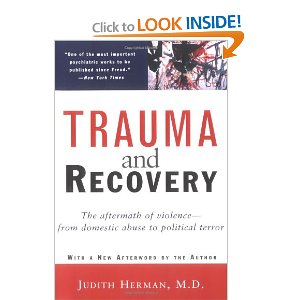 My good friend Christina found a photocopy of a chapter of Judith Herman’s book Trauma and Recovery: The aftermath of violence – from domestic abuse to political terror which had the following in:
My good friend Christina found a photocopy of a chapter of Judith Herman’s book Trauma and Recovery: The aftermath of violence – from domestic abuse to political terror which had the following in:
‘The core experiences of psychological trauma are disempowerment and disconnection from others. Recovery, therefore, is based upon the empowerment of the survivor and the creation of new connections.
Recovery can take place only within then context of relationships; it cannot occur in isolation. In her renewed connection with other people, the survivor re-creates the psychological facilities that were damaged or deformed by the traumatic experience.These faculties include the basic operations of trust, autonomy, initiative, competence, identity, and intimacy.
Just as these capabilities are formed in relationships with other people, they must be reformed in such relationships.
The first principle of recovery is empowerment of the survivor. She must be the author and arbiter of her own recovery. Others may offer advice, support, assistance, affection , and care, but not cure.
Many benevolent and well-intentioned attempts to assist the survivor founder because this basic principle of empowerment is not observed. No intervention that takes power away from the survivor can possibly foster her recovery, no matter how much it appears to be in her immediate best interest.
In the words of one incest survivor, “Good therapists were those who really valued my experience, and helped me to control my behavior rather than trying to control me.”
Caregivers schooled in a medical model of treatment often have difficulty grasping this fundamental principle, and putting it into practice…’


